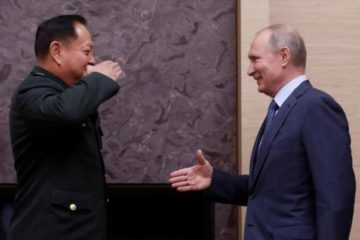Finding Better Ideas to Rebuild the American Economy: Noah Smith

published May 26th 2016, 1:22 pm, by Noah Smith
(Bloomberg View) —
The just-published book “Concrete Economics,” by University of California-Berkeley professors Brad DeLong and Stephen S. Cohen, needs an expanded sequel — 900 pages long, with charts, data, theory and an exhaustive list of historical case studies. That book would become the Bible of the New Industrialist movement that is just beginning to grope its way out of the ashes of the neoliberal free-market consensus. Perhaps that tome will get written. But DeLong and Cohen couldn’t wait to write it, because we need new ideas now, and they decided they had to put a sketch of those new ideas into people’s heads very quickly. And I agree with their decision.
If you’re at all concerned about economic policy, this is a book you need to read. It will take you only a couple of hours, and the time will be well-spent.
DeLong is an economic historian. Cohen studies urban planning and the environment. Their thesis is that when it comes to economic policy making, history is more important than theory, and politics is as important as markets. Their idea of good economic policy isn’t based — at least, not explicitly based — on any grand theory of how markets and governments ought to behave. You will not find free-market fundamentalism in this book, nor socialism.
Instead, DeLong and Cohen walk the reader through a series of historical examples of economic policies that seemed to work well. They start with Alexander Hamilton’s protection of infant industries, infrastructure spending, and encouragement of banking and manufacturing. The story continues through the building of the railroads (which depended on government land grants), the redistribution and trust-busting of the Progressive Era, the New Deal and the science-based industrial policy of the mid-20th century. They praise each of these eras, while criticizing what they see as the limitations and missteps of each.
In DeLong and Cohen’s telling, American economic policy ran off the rails in the 1970s and ’80s, when U.S. leaders stopped picking winners and started making policy based on abstract theory — in this case, free-market fundamentalism. When the U.S. let the market decide what the Next Big Thing would be, they argue, manufacturing faltered and finance and health care rushed in to fill the gap. Like so many others — at least since 2008 — DeLong and Cohen see U.S. health care as hopelessly inefficient, and finance as being full of rentiers who extract value from the economy instead of creating it. The void created by the U.S. embrace of unproductive industries, they argue, was filled by Asian economies eager to boost growth through exports, and unafraid of using industrial policy.
The peril of this sort of historical analysis is that it’s always easy to make the past fit some pattern after the fact. Sometimes policy causes big economic shifts, and sometimes it’s just along for the ride. A cautionary tale is provided by Japan’s experience, which DeLong and Cohen extol. Although Japan’s government certainly did try to pick winners — and still does — this probably stopped working around the late 1970s. For a good primer on how Japan’s industrial policy petered out, see “Can Japan Compete?,” by Michael Porter, Hirotaka Takeuchi and Mariko Sakakibara.
Nor have South Korea and China, for all their fast growth, yet managed to reach the income levels of the finance-ridden U.S. So the jury is still out on the Asian model, and any calls for America to emulate that template will justifiably be met with cautious skepticism.
But despite the inherent limitations of historical analysis, the message of “Concrete Economics” is one that U.S. policy makers need to hear. One reason is that DeLong and Cohen are absolutely right — the American mind has been far too captured by the beguilingly simple and powerful theory of free-market dogma. That theory was oversold, and we need a corrective. We need history.
Actually, within the walls of academia, free-market orthodoxy is already passe. Economics professors have poked a thousand holes in the case for laissez-faire, but until recently these findings stayed mostly within the ivory tower. These new ideas are in the background of DeLong and Cohen’s book — if you know about Dani Rodrik’s work on industrial policy, Jack Hirshleifer’s theory of finance, or the extensive literature on public goods, you can see their influence between the lines of “Concrete Economics.”
But DeLong and Cohen don’t focus on elevating these theories as a replacement for the nostrums of neoliberalism — instead, they want to frame policy ideas in terms that most people can understand. They recognize that getting support for a policy program requires buy-in from millions of people who will never read a single equation in a single economics model. Instead, DeLong and Cohen propose to frame economic policy programs in terms of simple, tangible, objectives. Build railroads across the West. Break up monopolies. Fund Big Science. Only with “concrete” goals like this, they argue, can policy makers muster consistent broad support for needed initiatives.
Thus, this short, almost casually sketched book is really the opening shot in a long campaign. That campaign is the quest to build a New Industrialism — an approach to economic policy that respects the power of the private sector but isn’t afraid of an activist government. No one quite knows what New Industrialism is going to be yet. “Concrete Economics” is meant to get people thinking about what it ought to be.
This column does not necessarily reflect the opinion of the editorial board or Bloomberg LP and its owners.
To contact the author of this story: Noah Smith at nsmith150@bloomberg.net To contact the editor responsible for this story: James Greiff at jgreiff@bloomberg.net
For more columns from Bloomberg View, visit Bloomberg view
copyright
© 2016 Bloomberg L.P







No Comment